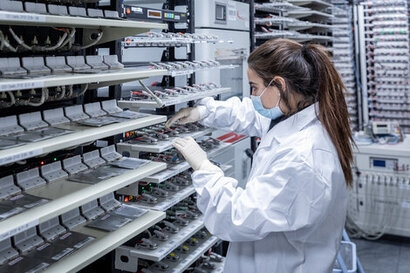
The new breakthrough technology covered by the patent will be accessible to the entire market, marking a first for an advanced automotive battery company. StoreDot is making the technology available to other organisations to help expand current charging infrastructure, speed up the global adoption of electric vehicles and create a zero-emissions world in the future.
The patent pending technology incorporates hardware and software advances that create a ‘booster’ feature, allowing the battery to analyse the capability of the charging station in real time and to adjust the battery’s ability to carry high current rates. This communication between a vehicle’s XFC battery and charging system means that cells can be charged faster, safely accepting a higher current without overheating. It also has the ability to immediately boost existing infrastructure systems, enabling faster charging, and thus optimising future fast-charge technologies without the need to upgrade to newer equipment in the near future.
“This is an important step for the EV global community as it will allow all of us to charge faster with very minimal changes to the current infrastructure and future deployment process” said Dr Doron Myersdorf, StoreDot CEO. “That is why we believe it’s critical to offer this world-leading innovation to other organisations on an open-source basis. The global uptake and appeal of electric vehicles is crucial if we want to live in a cleaner, zero-emissions world and by sharing this novel approach StoreDot aims to play a pivotal role in helping to achieve this objective. We want to work with and support the global community, including automotive manufacturers and infrastructure providers in their missions as well, especially when the industry is facing a number of charging infrastructure deployment challenges, not least the global semiconductor shortage.”

This is the latest development in StoreDot’s rapid advancement in extreme fast charging lithium-ion batteries for use in the automotive sector. The Company is in advanced talks with many global car makers and remains firmly on track to deliver mass-produced XFC batteries, which deliver a 50 percent reduction in charging time at the same cost, by 2024. The Company has a clear roadmap where it is already working on next generation XED, extreme energy density solid state technologies which will enter mass production in 2028.
For additional information:

